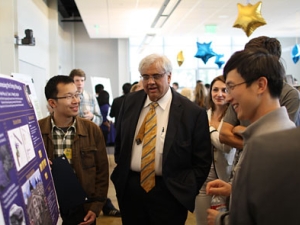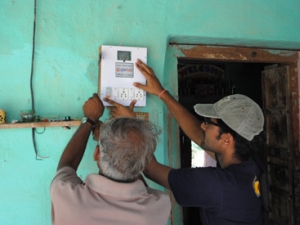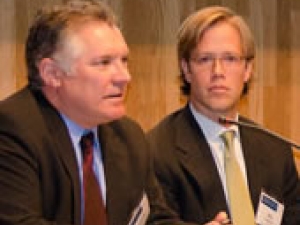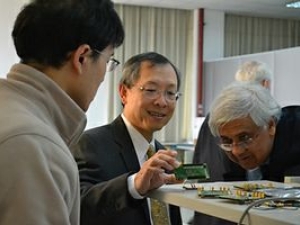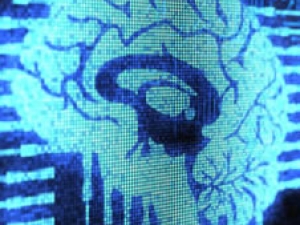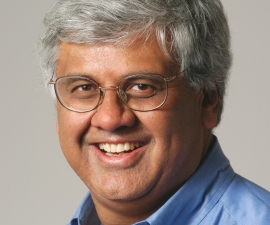

Research Bio
S. Shankar Sastry is a Professor of Electrical Engineering and Computer Science. His areas of research are embedded and autonomous software, AI, robotics, computer vision, nonlinear and adaptive control and learning, robotic vehicles in the air, ground and underwater, control of hybrid systems, robotic surgery, and biological motor control and prosthetics.
He has also been the Faculty Director of the Blum Center of Developing Economies from 2007 to 2022. He was the Dean of Engineering from 2008-2018, and the Director of the Center for Information Technology in the Interests of Society from 2005-2008. He was Chairman, Department of Electrical Engineering and Computer Sciences from 2001-2005. He was the Director of the Information Technology Office at DARPA. (with the equivalent military rank of a Major General) from 1999-2001. From 1996–1999, he was the Director of the Electronics Research Laboratory at Berkeley, an organized research unit on the Berkeley campus conducting research in computer sciences and all aspects of electrical engineering.
Dr. Sastry received his Ph.D. degree in 1981 from the University of California, Berkeley. He was on the faculty of MIT as Asst. Professor from 1980–1982 and at Harvard University as a chaired Gordon Mc Kay professor in 1994. He has received honorary doctorates from the Royal Institute of Technology, Stockholm (2008), University of Waterloo, Canada (2016), and the Politecnico di Torino (2018) and an MA Honoris Causa from Harvard in 1994.
Generalized Principal Component Analysis co-authored with R. Vidal and Yi Ma is his latest book, published by Springer Verlag in 2016. He has coauthored over 550 technical papers and 10 books, including Adaptive Control: Stability, Convergence, and Robustness (with M. Bodson, Prentice Hall, 1989), A Mathematical Introduction to Robotic Manipulation (with R. Murray and Z. Li, CRC Press, 1994), Nonlinear Systems: Analysis, Stability, and Control (Springer Verlag: ANalysis, Stability, and Control), An Invitation to #-D Vision: From Images to Geometric Models (with Y. Ma, S. Soatto, and J. Kosecka, Springer Verlag, 2003). He has co-edited Hybrid Control II, Hybrid Control IV and Hybrid Control V (with P. Antsaklis, A. Nerode, and W. Kohn, Springer Lecture Notes in Computer Science, 1995, 1997, and 1999, respectively) and co-edited Hybrid Systems: Computation and Control (with T.Henzinger, Springer-Verlag Lecture Notes in Computer Science, 1998) and Essays in Mathematical Robotics (with Baillieul and Sussmann, Springer-Verlag IMA Series).
Dr. Sastry has served as Associate Editor for numerous publications, including IEEE Proceedings, IEEE Transactions on Automatic Control; IEEE Control Magazine; IEEE Transactions on Circuits and Systems; the Journal of Mathematical Systems, Estimation and Control; IMA Journal of Control and Information; the International Journal of Adaptive Control and Signal Processing; Journal of Biomimetic Systems and Materials.
Dr. Sastry was elected into the National Academy of Engineering in 2001 “for pioneering contributions to the design of hybrid and embedded systems.” He also received the President of India Gold Medal in 1977, the IBM Faculty Development award for 1983–1985, the NSF Presidential Young Investigator Award in 1985 and the Eckman Award of the of the American Automatic Control Council in 1990, an M.A. (honoris causa) from Harvard in 1994, Fellow of the IEEE in 1994, the Distinguished Alumnus Award of the Indian Institute of Technology in 1999, and the David Marr prize for the best paper at the International Conference on Computer Vision in 1999. He is a Fellow of the American Academy of Arts and Sciences (2004). He received the Distinguished Alumnus Award from the International House at Berkeley in 2017 and the Berkeley Citation in 2018. He received the Chang-Lin Tien Education Leadership Award from the Asia Pacific Fund in 2010.
He has been on the corporate boards of C3, HCL Technologies, and the Chair of the Scientific Advisory Board of Eriksholm, the research arm of Oticon. He is currently on the board of Lexmark, LLC. He is the Honorary Chancellor of Plaksha University in Mohali, India.
Research Expertise and Interest
embedded and cyberphysical systems, artificial intelligence, AR/VR, computer science, robotics, arial robots, cybersecurity, cyber defense, homeland defense, nonholonomic systems, control of hybrid systems, sensor networks, interactive visualization, robotic telesurgery, rapid prototyping
In the News
New UC Berkeley Center to Address American Competitiveness in Advanced Technology
COVID-19 first target of new AI research consortium
Students think big ideas in tackling societal problems
Closing out almost nine months of intense competition, UC Berkeley’s annual Big Ideas contest honored this year’s crop of outstanding social projects last week during a special awards celebration at the Blum Center for Developing Economies.
USAID invests up to $20 million in UC Berkeley’s global development initiatives
UC Berkeley’s leadership in developing innovative and practical solutions for global problems is being recognized in a $20 million cooperative agreement with the U.S. Agency for International Development (USAID).
Simons Foundation awards UC Berkeley $60 million for theory of computing institute
The Simons Foundation has awarded a landmark $60 million grant to UC Berkeley to establish a theory of computing institute that promises to catalyze new advances in broad disciplines that affect our everyday lives, from how we spend our money to how we fight disease.
Berkeley hosts manufacturing brainstorm
Leaders from academia, government and industry gathered at UC Berkeley Monday to discuss partnership strategies to re-establish the United States as a global leader in advanced manufacturing.
Berkeley Engineering launches collaboration with Shanghai innovation hub
The College of Engineering at Berkeley is partnering with the Shanghai Zhangjiang Hi-Tech Park to develop a platform for expanding industrial and academic research collaborations in Asia and fostering global learning opportunities with Berkeley students.
Cybersecurity center developing techniques to attack the attackers
A UC Berkeley-led center to defend cyberspace is taking a proactive approach to securing the nation’s networks against attacks. Researchers from the Team for Research in Ubiquitous Secure Technology (TRUST), funded by the National Science Foundation, are developing systems with built-in immune systems that can recognize and protect against invasions. They are also influencing policy and have worked on pioneering California legislation requiring companies to notify individuals whose private information may have been compromised.
Agilent helps launch new synthetic biology center
Agilent Technologies Inc. has signed up to support the newly launched Synthetic Biology Institute (SBI), which will help advance efforts to engineer cells and biological systems in ways that could transform health and medicine, energy, the environment and new materials.
UC Berkeley, UCSF join forces to advance frontier of brain repair
Researchers at UC Berkeley and UCSF have launched the joint Center for Neural Engineering and Prostheses to develop technology that can translate brain signals into movements controlling prosthetic limbs, circumventing damaged or missing neural circuits in people suffering from disabling conditions.



